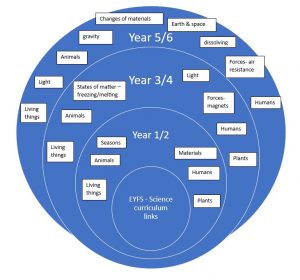Science Long Term Plan
Science Progression of Skills
Science Progression of Knowledge
A Hutton Henry scientist can investigate and question the world around them; conducting experiments and recording their findings using appropriate scientific vocabulary. They will develop an awe and wonder about the world they live in which encourages them to question and explore. They will be inspired to be like Steven Hawking and Jane Goodall.
Intent
The 2014 National Curriculum for Science aims to ensure that all children:
- develop scientific knowledge and conceptual understanding through the specific disciplines of biology, chemistry and physics
- develop understanding of the nature, processes and methods of science through different types of science enquiries that help them to answer scientific questions about the world around them
- are equipped with the scientific skills required to understand the uses and implications of science, today and for the future.
- We understand that it is important for lessons to have a skills-based focus, built on a foundation of supporting knowledge.
Through the Developing Experts scheme (Y1-6) and the teaching of science, children are encouraged to be inquisitive throughout their time at school and beyond. The Science curriculum fosters a healthy curiosity in children about our universe and promotes respect for the living and non-living. We believe science encompasses the acquisition of knowledge, concepts, skills and positive attitudes. Throughout the programmes of study, the children will acquire and develop the key knowledge that has been identified within each unit and across each year group, as well as the application of scientific skills. We ensure that the Working Scientifically skills are built-on and developed throughout children’s time at the school so that they can apply their knowledge of science when using equipment, conducting experiments, building arguments and explaining concepts confidently and continue to ask questions and be curious about their surroundings.
Implementation
Teachers create a positive attitude to science learning within their classrooms and reinforce an expectation that all children are capable of achieving high standards in science. Our whole school approach to the teaching and learning of science involves the following;
- Science will be taught, planned and arranged in topic blocks using the Developing Experts scheme of work, as well as adaptions by the class teacher.
- The teachers are able to use their professionalism and experience to adapt planning, ensuring that the national curriculum is taught, and making adjustments to the Developing Experts scheme if they deem necessary e.g. when it may go beyond the scope of the national curriculum and that is not suitable for their cohort.
- Through our planning, we involve problem-solving opportunities that allow children to find out for themselves. Children are given opportunities to use their scientific skills and research to discover the answers to scientific questions. This curiosity is celebrated within the classroom. Planning involves teachers creating engaging lessons, often involving high-quality resources to aid understanding of conceptual knowledge. Teachers use questioning in class to test conceptual knowledge and skills and assess children regularly to identify those children with gaps in learning, so that all children keep up.
- We build upon the learning and skill development of the previous years. As the children’s knowledge and understanding increases, and they become more proficient in selecting, using scientific equipment, collating and interpreting results, they become increasingly confident in their growing ability to come to conclusions based on real evidence.
- Working Scientifically skills are embedded into lessons to ensure these skills are being developed throughout the children’s school career and new vocabulary and challenging concepts are introduced through direct teaching. This is developed through the years, in-keeping with the topics. As the scheme has incorporated a range of science investigations in the planning, children are being taught the range of skills required for ‘working scientifically’ in addition to the knowledge coverage.
- Teachers demonstrate how to use scientific equipment, and the various Working Scientifically skills in order to embed scientific understanding. Teachers find opportunities to develop children’s understanding of their surroundings by accessing outdoor learning and workshops with experts.
In early years, children are introduced to scientific ideas and learning which are then revisited in their journey through key stage one and key stage two. Learning deepens with each revisit and links are made between ideas and concepts. What does science look like in the Early Years
From EYFS to year 6 – links in the science curriculum.

Cross curricular/ fieldwork case studies and links to outdoor learning can be explored more on the outdoor learning page
Impact
The successful approach at Developing Experts results in a fun, engaging, high-quality science education, that provides children with the foundations and knowledge for understanding the world. Our engagement with the local environment ensures that children learn through varied and first-hand experiences of the world around them. Frequent, continuous and progressive learning outside the classroom is embedded throughout the science curriculum during outdoor learning.
Through various workshops, trips and interactions with experts and local charities, children have the understanding that science has changed our lives and that it is vital to the world’s future prosperity. Children learn the possibilities for careers in science, as a result of our expert films and curriculum links to industry, ensuring that children have access to positive role models within the field of science from a range of science disciplines and Stem related industries. From this exposure to a range of different scientists from various backgrounds, all children feel they are scientists and capable of achieving. Using Developing Experts, we aim to ensure every child enjoys science which results in motivated learners with sound scientific understanding.
